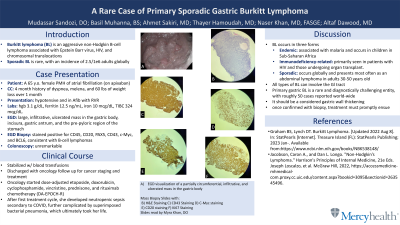Sunday Poster Session
Category: Stomach
P1356 - A Rare Case of Primary Sporadic Gastric Burkitt Lymphoma
Sunday, October 22, 2023
3:30 PM - 7:00 PM PT
Location: Exhibit Hall

Has Audio
.jpg)
Mudassar Sandozi, DO
MercyHealth
Rockford, IL
Presenting Author(s)
Mudassar Sandozi, DO1, Basil Muhanna, 2, Ahmet Sakiri, MD1, Thayer Hamoudah, MD1, Naser Khan, MD1, Altaf Dawood, MD, MBBS1
1MercyHealth, Rockford, IL; 2University of Illinois College of Medicine, Rockford, IL
Introduction: Burkitt lymphoma (BL) is an aggressive form of non-Hodgkin B-cell lymphoma associated with Epstein Barr virus, human immunodeficiency virus, and chromosomal translocations. Sporadic BL is a rare condition with an incidence of 2.5 per 1 million adults globally. Although secondary involvement of the GI tract is common in lymphomas, primary gastric lymphomas are rare. We present a case of gastric Burkitt’s lymphoma in a patient presenting with symptoms of severe iron deficiency anemia.
Case Description/Methods: A 65-year-old female with history of atrial fibrillation (on apixaban) presented to the ED with a 4 month history of dyspnea, melena, and 60 lbs of weight loss. On presentation, patient was hypotensive and in Afib with a rapid ventricular response. Labs showed severe iron deficiency anemia (hemoglobin 3.1 g/dL, ferritin 12.5 ng/mL, iron 10 mcg/dL, and TIBC 324 mcg/dL). Colonoscopy was unremarkable. EGD revealed a large, infiltrative, ulcerated mass in the gastric body, incisura, gastric antrum, and the pre-pyloric region of the stomach. Biopsied tissue stained positive for CD45, CD20, PAX5, CD43, c-Myc, and BCL6, consistent with B-cell lymphomas. After blood transfusions and stabilization, she was discharged with instructions to follow up with oncology for cancer staging and treatment options. The patient was started on dose-adjusted etoposide, doxorubicin, cyclophosphamide, vincristine, prednisone, and rituximab (DA-EPOCH-R) chemotherapy. After her first treatment cycle, she developed neutropenic sepsis secondary to COVID, further complicated by superimposed bacterial pneumonia, which ultimately took her life.
Discussion: BL occurs in three forms: endemic, immunodeficiency-related, and sporadic. Endemic BL is most commonly associated with malaria and occurs in children in Sub-Saharan Africa. Immunodeficiency-related BL is primarily seen in patients with HIV and those undergoing organ transplant. Sporadic BL occurs globally and presents most often as an abdominal lymphoma in adults 30-50 years old. All types of BL can involve the GI tract. Primary gastric BL is a rare and diagnostically challenging entity, with roughly 50 cases reported world-wide. BL has a growth fraction near 100% and a doubling time of 24 hours. Patients can present with weight loss, progressive anemia, or fatal hemorrhage. It should be a considered differential when gastric wall thickening is present on endoscopic evaluation, and once confirmed with biopsy, treatment must promptly ensue.

Disclosures:
Mudassar Sandozi, DO1, Basil Muhanna, 2, Ahmet Sakiri, MD1, Thayer Hamoudah, MD1, Naser Khan, MD1, Altaf Dawood, MD, MBBS1. P1356 - A Rare Case of Primary Sporadic Gastric Burkitt Lymphoma, ACG 2023 Annual Scientific Meeting Abstracts. Vancouver, BC, Canada: American College of Gastroenterology.
1MercyHealth, Rockford, IL; 2University of Illinois College of Medicine, Rockford, IL
Introduction: Burkitt lymphoma (BL) is an aggressive form of non-Hodgkin B-cell lymphoma associated with Epstein Barr virus, human immunodeficiency virus, and chromosomal translocations. Sporadic BL is a rare condition with an incidence of 2.5 per 1 million adults globally. Although secondary involvement of the GI tract is common in lymphomas, primary gastric lymphomas are rare. We present a case of gastric Burkitt’s lymphoma in a patient presenting with symptoms of severe iron deficiency anemia.
Case Description/Methods: A 65-year-old female with history of atrial fibrillation (on apixaban) presented to the ED with a 4 month history of dyspnea, melena, and 60 lbs of weight loss. On presentation, patient was hypotensive and in Afib with a rapid ventricular response. Labs showed severe iron deficiency anemia (hemoglobin 3.1 g/dL, ferritin 12.5 ng/mL, iron 10 mcg/dL, and TIBC 324 mcg/dL). Colonoscopy was unremarkable. EGD revealed a large, infiltrative, ulcerated mass in the gastric body, incisura, gastric antrum, and the pre-pyloric region of the stomach. Biopsied tissue stained positive for CD45, CD20, PAX5, CD43, c-Myc, and BCL6, consistent with B-cell lymphomas. After blood transfusions and stabilization, she was discharged with instructions to follow up with oncology for cancer staging and treatment options. The patient was started on dose-adjusted etoposide, doxorubicin, cyclophosphamide, vincristine, prednisone, and rituximab (DA-EPOCH-R) chemotherapy. After her first treatment cycle, she developed neutropenic sepsis secondary to COVID, further complicated by superimposed bacterial pneumonia, which ultimately took her life.
Discussion: BL occurs in three forms: endemic, immunodeficiency-related, and sporadic. Endemic BL is most commonly associated with malaria and occurs in children in Sub-Saharan Africa. Immunodeficiency-related BL is primarily seen in patients with HIV and those undergoing organ transplant. Sporadic BL occurs globally and presents most often as an abdominal lymphoma in adults 30-50 years old. All types of BL can involve the GI tract. Primary gastric BL is a rare and diagnostically challenging entity, with roughly 50 cases reported world-wide. BL has a growth fraction near 100% and a doubling time of 24 hours. Patients can present with weight loss, progressive anemia, or fatal hemorrhage. It should be a considered differential when gastric wall thickening is present on endoscopic evaluation, and once confirmed with biopsy, treatment must promptly ensue.

Figure: Figure 1: EGD visualization of a partially circumferential, infiltrative, and ulcerated mass in the gastric body.
Disclosures:
Mudassar Sandozi indicated no relevant financial relationships.
Basil Muhanna indicated no relevant financial relationships.
Ahmet Sakiri indicated no relevant financial relationships.
Thayer Hamoudah indicated no relevant financial relationships.
Naser Khan indicated no relevant financial relationships.
Altaf Dawood indicated no relevant financial relationships.
Mudassar Sandozi, DO1, Basil Muhanna, 2, Ahmet Sakiri, MD1, Thayer Hamoudah, MD1, Naser Khan, MD1, Altaf Dawood, MD, MBBS1. P1356 - A Rare Case of Primary Sporadic Gastric Burkitt Lymphoma, ACG 2023 Annual Scientific Meeting Abstracts. Vancouver, BC, Canada: American College of Gastroenterology.
